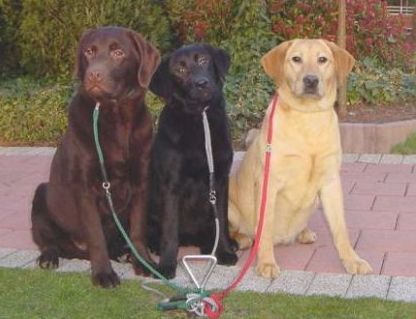Although the Lab is the epitome of family dogs, he needs a fairly active household to satisfy his need for exercise and work. Daily walks, romps in a fenced yard, and games of fetch keep his mind and body in shape. Unless these needs are satisfied, the Lab may become a wanderer, a digger, or a chewer. First off, the new Lab puppy should be leash trained and taught to sit on command to prevent his jumping on people in his desire to say hello. The pup can also be taught early to shake paws and to fetch; his soft mouth and innate desire to retrieve can provide hours of play. Later on, the pup can learn to put his nose to use and find things that have been hidden for him.
A fast-growing Lab pup reaches almost adult weight within six or seven months and can be a handful to train if left to his own devices 'til then. He is exuberant, a trait that can get him into trouble with other dogs and with the neighbors who do not appreciate his antics. Therefore early training is essential; if you wait too long, his rambunctious character and strong body will be difficult to manage, especially for those who have not previously had the pleasure of owning such a dog. To avoid training problems and grease the skids of your relationship, take your Lab pup to puppy and basic obedience classes to teach manners, and keep up this good citizen training for the life of the dog. (AKC offers a Canine Good Citizen certificate for those dogs that can pass a 10-step test. Information is available at http://www.akc.org/events/cgc/program.cfm.)
All members of the family should participate in the training at home. If Mary or Dad allows the dog on the sofa when Mom's not around, the dog is going to be either confused or sneaky, so consistency between family members is necessary.
Discipline should be gentle - no screaming at the pup or smacking with a newspaper, as these reactions to misbehavior are counterproductive. Labs are generally eager to learn, so firm but gentle guidance and discipline pay off in a strong bond with family members.
Feeding a Lab pup is more difficult than buying a premium food and letting him eat his fill. As a fast-growing breed subject to hip dysplasia, the Lab puppy should be fed a diet prepared for large-breed puppies or regular adult dog food of less than 25 percent protein to help avoid joint problems that can occur when puppies grow too fast. Offer him food two or three times a day and take away what he doesn't eat in 10 minutes. Teach him to sit before putting the food bowl on the floor to avoid his jumping at the dish and spilling the food.
Some Labs are taller or heavier than the preferred standard size. Most Labs have a tendency to become obese, so their diets must be closely controlled. Owners who use treats to train must be careful to cut back on regular meals to avoid unhealthy weight gain. Older Labs enjoy the couch and the fire; if fed too much or not given enough exercise they will fatten up rather quickly.






